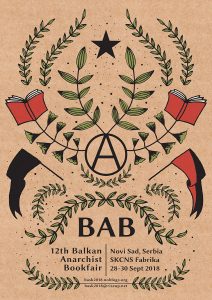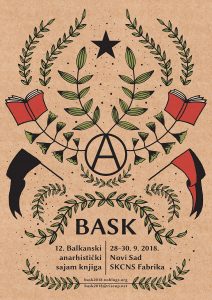Izjava učesnika 5. Balkanskog anarhističkog sajma knjiga
U proteklih 30 godina narod na Balkanu je iskusio brutalnost rata, nacionalizma, fašizma i mera MMF-a – bila je to rekonstrukcija kapitalizma u svom najboljem obliku. Zato je i potreba da se Balkan transformiše u prostor borbe, anti-nacionalizma i solidarnosti, konkretno, počinjući odmah i odozdo očigledna. Upravo nas je ova potreba dovela u Zrenjanin, u periodu od 29. do 31. oktobra 2010. na 5. Balkanski anarhistički sajam knjiga (BASK). Bilo nas je mnogo i došli smo sa čitavog Balkana i šire. Došli smo sa zajedničkim shvatanjem da je BASK zajednički prostor gde se lokalne borbe dele, komuniciraju i podržavaju, gde se razmenjuju iskustva i analize, gde se grade savezi i razvijaju zajednički projekti na osnovama anti-autoritarnosti, solidarnosti i poštovanja.
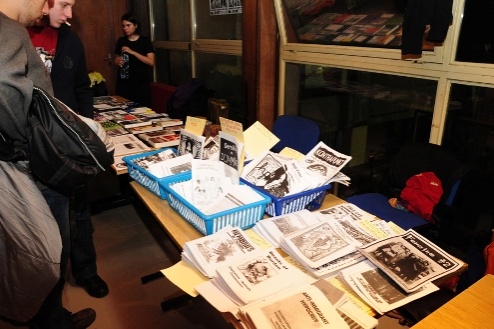
Nasuprot prevladavajućem mišljenju da su sukobi koji su u bližoj istoriji oblikovali naš deo sveta nekakvi ostaci 19. veka, mi smatramo da to nije slučaj. Balkan nije prošlost, Balkan je budućnost Evrope. Ratovi iz devedesetih nisu bili “poslednji ratovi devetnaestog veka”, već prva jasna manifestacija destruktivnog sadržaja kapitalističkih odnosa, za čije su uvođenje ti isti ratovi pružili pokriće od neprocenjive važnosti. U budućnosti, destruktivnost kapitala će se manifestovati u različitim oblicima, koji će u mnogome zavisiti od lokalnih specifičnosti, kao što je postojanje veštački stvorenih socijalnih podela, ali jedno je sigurno: biće brutalna. Upravo je Balkan bio među prvim metama prve faze neo-liberalnog napada globalnog kapitala: svi oblici kolektivnih aktivnosti koji postoje izvan kapitalizma su gotovo potpuno uništeni, a pod zastavom nacionalizma nove podele su uspešno uvedene.
Uporedo sa tim i skriveno od pogleda, sistematski su stvarani uslovi za neograničenu vlast kapitala (od prodaje fabrika zarad zemljišta, preko uspostavljanja slobodnih zona za investitore, do omogućavanja ubrzanog zaobilaženja pravila i regulacija kompanijama, prilikom realizacije njihovih investicionih projekata), stvarajući pri tom novo siromaštvo. Da bismo danas bili u stanju da pružimo delotvoran odgovor moramo razumeti ono što se desilo u prošlosti. Razumeti iznenadnu pojavu nacionalizma i strahota do kojih je on doveo, takođe znači razumeti ulogu koju su u ovom procesu odigrale vodeće finansijske institucije, npr kroz politiku MMF-a sprovođenu u to vreme u većini zemalja bivše Jugoslavije, a koja se sada trajno vratila – videti današnju Grčku.
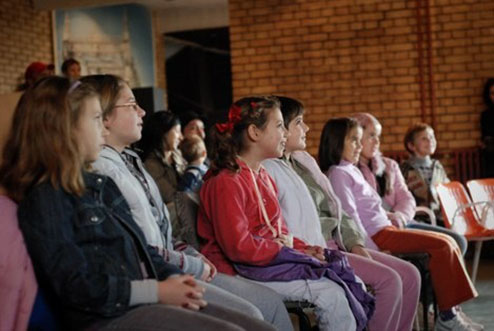
Zaista se mnogo toga dogodilo na Balkanu u poslednjih 30 godina, ali sve te posebnosti govore o istom planu globalnih finansijskih instititucija kojeg sprovode njhove verne sluge na lokalu: oduzeti moć narodu, i podvesti nas sve trajno pod vlast kapitala. Transformacija Balkana u zonu sukoba i ratova je bio rani trenutak u globalnom kapitalističkom ratu, koji se sada seli ka ostatku Evrope.
Poslednji lokalni primer brutalnih podela koje nam se svima nameću, i primer toga kako napad na društvo ostavlja ljude oslabljenima i zbunjenima jeste incident od pre samo nekoliko nedelja, u Beogradu, tokom Parade ponosa. Posle više od dvadeset godina devastirajuće ekonomske i društvene krize, posle destrukcije sredstava održivosti, videli smo da se ljudi i dalje ne bore protiv onih koji su zaista uzrokovali sve ove nevolje. Umesto toga, postoje brojne fašističke grupe koje su u stanju da mobilišu veliki broj ljudi i pristalica, a sa ciljem linčovanja manjinskih grupa. Šest hiljada ljudi je učestvovalo u napadu na Paradu ponosa, dok je u isto vreme beogradsko romsko naselje napadnuto molotovljevim koktelom. Ova poslednja manifestacija mržnje i agresije je konstitutivni deo novog i nadolazećeg kapitalističkog režima.
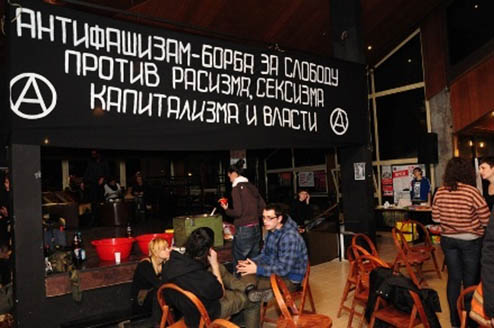
Za nas je ovo veoma konkretan pokazatelj naših zajedničkih slabosti i nemogućnosti socijalnih pokreta da se na smislen način odupru ugnjetavačkim režimima. Parada ponosa je još jednom i na veoma jasan način pokazala neophodnost organizovanja naših borbi na drugačiji način, putevima izvan države i njihovih marioneta, i uspotavljanjem prostora, struktura, načina, i kanala komunikacije koji će ostati autonomni, potpuno naši, gde je uzajamna pomoć shvaćena kao sredstvo otpora svakodnevna praksa. Radeći na ovom cilju mi izražavamo našu posvećenost građenju drugarstva i saveza u borbi i kroz borbe na čitavom Balkanu i deljenju resursa i iskustva na konkretan način.
Pošto je BASK mesto susreta, mnogo informacija je razmenjeno o poslednjim borbama, ne samo na Balkanu, već i o onim borbama u koje su uključeni pokreti iz celog sveta. Između ostalog informisali smo se i o situaciji u Rusiji gde aktivisti žive u situaciji ekstremne tenzije i nasilja. Ovom izjavom takođe priključujemo svoj glas drugovima i drugaricama koji su pozvali na međunradone akcije solidarnosti između 12.i 15. novembra 2010. u znak podrške antifašističkim aktivistima kojima se trenutno sudi u Rusiji zbog njihovog učešća u lokalnim ekološkim borbama.
Učesnici i učesnice 5. Balkanskog anarhističkog sajma knjiga
U Zrenjaninu, 31. 10. 2010.
————-
The statement of the participants of the Fifth Balkan anarchist bookfair
Over the last 30 years people in the Balkans have experienced brutality of war, nationalism, fascism and IMF policies – it has truly been a capitalist reconstruction at its finest. The need to transform the Balkans into a space of struggle, anti-nationalism and solidarity, concretely, starting now and from below, is obvious. It is this need that has brought us to Zrenjanin between 29-31 October 2010 for the 5th Balkan anarchist book fair [BAB]. We came from all over the Balkans, and beyond. We came with a shared understanding that BAB is a common space where local struggles are shared, communicated and supported, where experiences and analysis are exchanged, where alliances are being built and common projects developed on the basis of anti-authoritarianism, solidarity and respect.
Contrary to the prevailing belief that conflicts that have shaped our part of the world lately are some old remnants of the “19th century”, we think this is not the case. The Balkans are not the past, they are the future of Europe. The wars of the 1990s were not the “last wars of 19th century”, but the first clear manifestations of the destructive content of capitalist relations for the introduction of which those same wars have provided an invaluable cover. In the future the destructiveness of capital will manifest itself in different forms, much depending on local specificities, such as the existing or artificially created social divisions, but one thing is for sure: It will be brutal. It was the Balkans that were among the first targets of the first phase of the neoliberal attack of global capital: forms of collective activity that existed outside of capitalism were all but destroyed, under the banner of nationalism new separations were succesfully installed. Parallel to that and hidden from view, conditions were systematically being established for the free reign of capital (from selling factories for land to installing Free Zones for investment to enabling companies “fast track” bypassing of regulations for their investment projects), creating new poverty in the process.
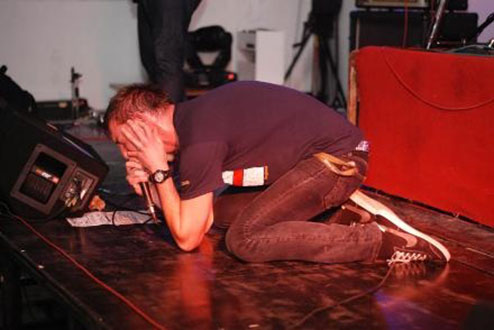
In order to be able to develop a working response today we need to understand what happened in the past. To understand the sudden emergence of nationalism and the horrors that it brought means also to understand the role the leading financial institutions played in this process, for an example through IMF policies of the time, for instance
in most Former Yugoslav countries, which are back for good – see today’s Greece. Much has indeed happened in the Balkans in the last thirty years, but all the particularities tell the story of the same general agenda pursued by the global financial institutions and implemented by their loyal local servants: to take away power from the people, and bring us all firmly under the regime of capital. The transformation of the Balkans into a zone of conflict and war was an early moment in a global capitalist war, that is now moving towards the rest of Europe.
The latest local example of brutal divisions that are being imposed on us all, and of how the attack against society is leaving people weakened and confused, is an incident just a couple of weeks ago in Belgrade during the Pride Parade. After more than twenty years of devastating economic and social crisis and destruction of the means of sustainability, we have seen people are still not fighting against those who are actually at the source of all this carnage. Instead, numerous fascist groups exist that are able to mobilize huge numbers of supporters for the purpose of lynching minority groups. Six thousand people participated in the attack on the Pride Parade, while at the same time the Belgrade Roma settlement was attacked by a petrol bomb. This latest manifestation of hate and aggression is a constitutive part of the new emerging capitalist regime. For us it has revealed in a very concrete way our common weaknesses and the incapability of social movements to resist meaningfully to the oppressive regime.
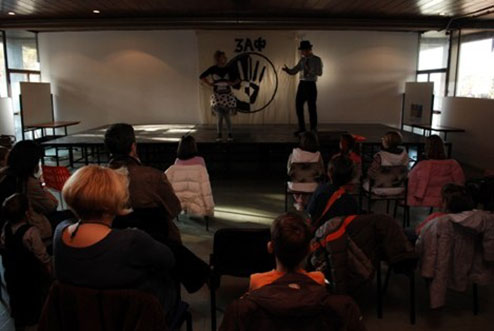
The Pride Parade has once again very clearly shown the necessity to organize our struggles differently, outside of the state and its proxies, and to establish spaces, structures, modes and channels of communication that remain autonomous, completely our own and where mutual aid is an everyday practice and understood as a tool of resistance. Working
towards this goal we express our commitment to forging comradeships and alliances in struggle and through struggle across the Balkans and to sharing our resources and experience in a concrete way.
BAB being a point of convergence, a lot of information was shared about the latest struggles, not only in the Balkans, but also about those that movements in the whole world are involved in. Among others, we were informed about the situation in Russia where activists are living in a situation of extreme tension and violence. With this statement we
also join our voice with comrades who called for international solidarity actions between 12th and 15th November 2010 in support of antifascist activists that are currently prosecuted in Russia for their contribution to the local ecological struggle.
Participants of 5th Balkan anarchist bookfair

